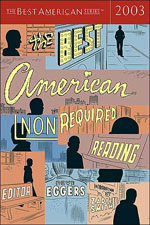[Transcribed discussion of “The Eureka Hunt,” by Jonah Lehrer, published in The New Yorker.
Lehrer’s article explores how good ideas come to us. The author talks with neurologists and psychologists about the interplay between right- and left-brain, and about how brain-imaging techniques reveal the complex web of communication our gray matter uses to solve problems. For example, the writer explains why our good ideas so often come to us in the shower. Mental relaxation—as one might experience under warm water—can be more crucial to having an epiphany than brow-furrowing concentration.]
Javier: This was definitely interesting. It had a lot of depth. After I put it down, I was thinking about this stuff for the next few days. Any time an author does that to me it’s good.
Will: I liked that it wasn’t as hard to follow as some other science-related articles we’ve read. It’s tough to write about science for a non-scientist audience. He didn’t dive so deep that he lost us. But at the same time he really dug into his subject matter.
Javier: It made sense, too. It was true to my experience. My parents are always telling me to wake up early. They say the morning is the best time for thinking. [Lehrer] is saying that too—just after you wake up is the best time to do things that take a lot of mental energy. Like homework. Sometimes I have great ideas in the shower.
Will: Sometimes you’ll wake up and have something on your mind from the night before and it doesn’t click until morning, just like he says.
Javier: Although I will say I’m not always that sharp in the morning. But that’s probably because I go to bed too late. Another thing I was really into was the story about the fireman he used in the beginning.
[Lehrer introduces his essay with a story of a Montana fireman caught in a massive forest fire. The fire was advancing at a rate of seven hundred feet per minute. With no time to outrun it, the fireman lit a match and burned a patch of grass just large enough for him to lie down in. The fire jumped over the fireman as he lay there but killed thirteen other firefighters who couldn’t outrun it. Later, he couldn’t explain how he’d suddenly come to the idea of burning himself a small haven. It was an epiphany. All he could say was “it just seemed the logical thing to do.”]
Will: Yeah that story was perfect for this. The author was able to combine a story like that with an essay on brain science. So we get a little human narrative and some science to help us understand what’s happening in the narrative.
Javier: I agree. That introduction drew me in. And then he came back to it in the end nicely. It also fits well because the idea of Eureka! is that you kind of get struck by lightning. And this fire in Montana was started by a lightning strike.
Will: I noticed that while I was reading the story I started thinking about what was happening in my brain. It was making me conscious of my own insight process even while I was reading.
Subscribe to:
Post Comments (Atom)









No comments:
Post a Comment